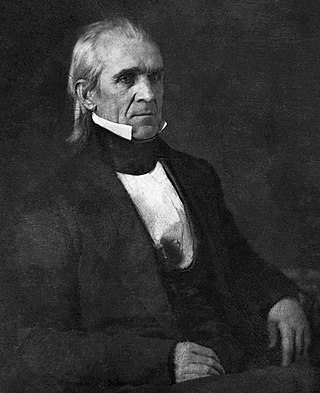
James Knox Polk was the 11th president of the United States, serving from 1845 to 1849. He also served as the 13th speaker of the House of Representatives from 1835 to 1839 and the ninth governor of Tennessee from 1839 to 1841. A protégé of Andrew Jackson, he was a member of the Democratic Party and an advocate of Jacksonian democracy. Polk is known for extending the territory of the United States through the Mexican–American War during his presidency, annexing the Republic of Texas, the Oregon Territory, and the Mexican Cession after winning the Mexican–American War.

Mexico City is the capital and largest city of Mexico, and the most populous city in North America. Mexico City is one of the most important cultural and financial centers in the world. It is located in the Valley of Mexico within the high Mexican central plateau, at an altitude of 2,240 meters (7,350 ft). The city has 16 boroughs or demarcaciones territoriales, which are in turn divided into neighborhoods or colonias.

Albuquerque, also known as ABQ, Burque, and the Duke City, is the most populous city in the U.S. state of New Mexico. Founded in 1706 as La Villa de Alburquerque by Santa Fe de Nuevo México governor Francisco Cuervo y Valdés, and named in honor of Francisco Fernández de la Cueva, 10th Duke of Alburquerque and Viceroy of New Spain, it served as an outpost on El Camino Real linking Mexico City to the northernmost territories of New Spain.

Samuel Houston was an American general and statesman who played a prominent role in the Texas Revolution. He served as the first and third president of the Republic of Texas and was one of the first two individuals to represent Texas in the United States Senate. He also served as the sixth governor of Tennessee and the seventh governor of Texas, the only individual to be elected governor of two different states in the United States.

Winfield Scott was an American military commander and political candidate. He served as Commanding General of the United States Army from 1841 to 1861, having taken part in the War of 1812, the Mexican–American War, the early stages of the American Civil War serving the union, and also in the American Indians wars earlier in his career. Scott was the Whig Party's presidential nominee in the 1852 election, but was defeated by Democrat Franklin Pierce. He was known as Old Fuss and Feathers for his insistence on proper military etiquette, as well as the Grand Old Man of the Army for his many years of service.
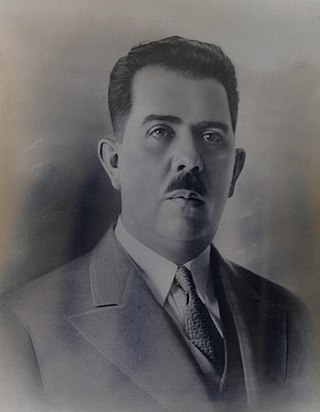
Lázaro Cárdenas del Río was a Mexican army officer and politician who served as president of Mexico from 1934 to 1940. Previously, he served as a general in the Constitutional Army during the Mexican Revolution and as Governor of Michoacán and President of the Institutional Revolutionary Party. He later served as the Secretary of National Defence. During his presidency, which is considered the end of the Maximato, he implemented massive land reform programs, led the expropriation of the country's oil industry, and implemented many left-leaning reforms.

Plutarco Elías Calles was a Mexican soldier and politician who served as President of Mexico from 1924 to 1928. After the assassination of Álvaro Obregón, Elías Calles founded the Institutional Revolutionary Party and held unofficial power as Mexico's de facto leader from 1929 to 1934, a period known as the Maximato. Previously, he served as a general in the Constitutional Army, as Governor of Sonora, Secretary of War, and Secretary of the Interior. During the Maximato, he served as Secretariat of Public Education, Secretary of War again, and Secretary of the Economy. During his presidency, he implemented many left-wing populist and secularist reforms, opposition to which sparked the Cristero War.

Clinton Presba Anderson was an American politician who represented New Mexico in the United States Senate from 1949 until 1973. A member of the Democratic Party, he previously served as United States Secretary of Agriculture from 1945 until 1948 and represented New Mexico's at-large congressional district from 1941 until 1945.
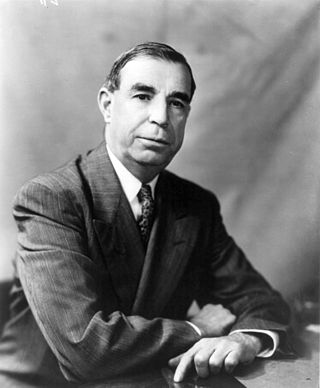
Dionisio "Dennis" Chávez was an American politician who served in the United States House of Representatives from 1931 to 1935, and in the United States Senate from 1935 to 1962. He was the first Hispanic to be elected to a full term in the US Senate and the first US Senator to be born in New Mexico, which was still a US territory at the time of his birth.

Rafael Osuna Herrera , nicknamed "El Pelón", was a former world No. 1 tennis player, the most successful player in the history of Mexico and an Olympian. He was born in Mexico City, and is best remembered for his singles victory at the U.S. Open Championships in 1963, winning the 1960 and 1963 Wimbledon Doubles championships, the 1962 U.S. Open Championships doubles, and for leading Mexico to its only Davis Cup Final round appearance in 1962. He is the only Mexican to date to be inducted into the International Tennis Hall of Fame, in 1979.

Alejandro Encinas Rodríguez is a Mexican left-wing politician who served as the acting Secretary of the Interior in June 2023. He was previously affiliated with the Party of the Democratic Revolution, the Unified Socialist Party of Mexico, the Mexican Socialist Party and the Mexican Communist Party. He served as the 4th Head of Government of the Federal District from 2005 to 2006. Encinas serves in the upper house of Congress as senator representing the State of Mexico.
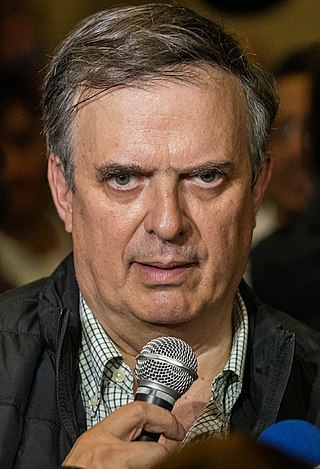
Marcelo Luis Ebrard Casaubón is a Mexican politician who served as Secretary of Foreign Affairs until 2023. Affiliated with the National Regeneration Movement (MORENA) since 2018, he was appointed to lead the foreign ministry by President Andrés Manuel López Obrador on 1 December 2018. In June 2023, he resigned from his post to compete for his party's presidential candidacy for the 2024 election.
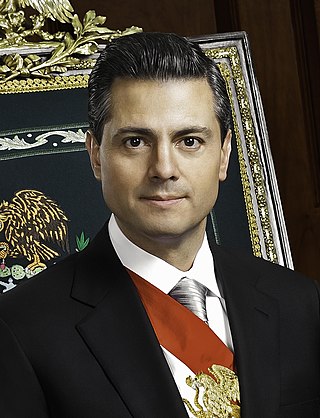
Enrique Peña Nieto, commonly referred to by his initials EPN, is a Mexican former politician who served as the 64th president of Mexico from 2012 to 2018. A member of the Institutional Revolutionary Party (PRI), he previously served as Governor of the State of Mexico from 2005 to 2011, local deputy from 2003 to 2004, and Secretary of Administration from 2000 to 2002.

Ben Ray Luján is an American politician who has served as the junior United States senator from New Mexico since 2021. He served as the U.S. representative for New Mexico's 3rd congressional district from 2009 to 2021 and as Assistant Speaker from 2019 to 2021. He served as a member of the New Mexico Public Regulation Commission from 2005 to 2008, where he also served as chairman.

Zachary Taylor was an American military leader who served as the 12th president of the United States from 1849 until his death in 1850. Taylor was a career officer in the United States Army, rising to the rank of major general and becoming a national hero for his victories in the Mexican–American War. As a result, he won election to the White House despite his vague political beliefs. His top priority as president was to preserve the Union. He died 16 months into his term from a stomach disease.

The Mexican–American War, also known in the United States as the Mexican War, and in Mexico as the United States intervention in Mexico, was an invasion of Mexico by the United States Army from 1846 to 1848. It followed the 1845 American annexation of Texas, which Mexico still considered its territory because Mexico refused to recognize the Treaties of Velasco, signed by President Antonio López de Santa Anna after he was captured by the Texian Army during the 1836 Texas Revolution. The Republic of Texas was de facto an independent country, but most of its Anglo-American citizens who had moved from the United States to Texas after 1822 wanted to be annexed by the United States.

Chihuahua, officially the Estado Libre y Soberano de Chihuahua, is one of the 31 states which, along with Mexico City, comprise the 32 federal entities of Mexico. It is located in the northwestern part of Mexico and is bordered by the states of Sonora to the west, Sinaloa to the southwest, Durango to the south, and Coahuila to the east. To the north and northeast, it shares an extensive border with the U.S. adjacent to the U.S. states of New Mexico and Texas. The state was named after its capital city, Chihuahua City; the largest city is Ciudad Juárez.

Antonio de Padua María Severino López de Santa Anna y Pérez de Lebrón, usually known as Antonio López de Santa Anna, or just Santa Anna, was a Mexican soldier, politician, and caudillo who served as the 8th president of Mexico multiple times between 1833 and 1855. He also served as Vice President of Mexico from 1837 to 1839. He was a controversial and pivotal figure in Mexican politics during the 19th century, to the point that he has been called an "uncrowned monarch", and historians often refer to the three decades after Mexican independence as the "Age of Santa Anna".
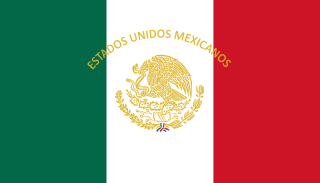
The president of Mexico, officially the president of the United Mexican States, is the head of state and head of government of Mexico. Under the Constitution of Mexico, the president heads the executive branch of the federal government and is the commander-in-chief of the Mexican Armed Forces. The current president is Andrés Manuel López Obrador. The current president-elect is Claudia Sheinbaum Pardo, who will take office in October 1st, 2024.
Roberto Córdova was a Mexican jurist, international judge, and diplomat. Córdova served as a judge for the International Court of Justice (ICJ) between 1955 and 1964. He was the second Mexican to serve as an ICJ judge, following Isidro Fabela.


















